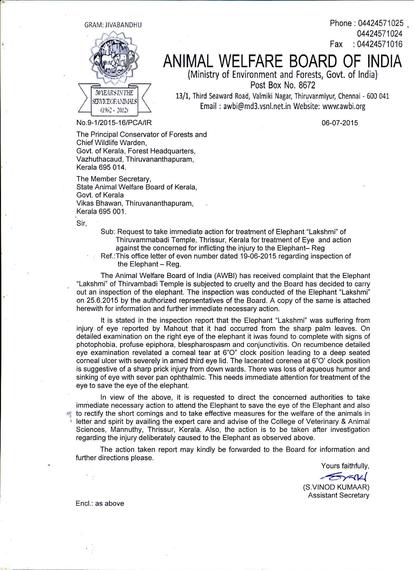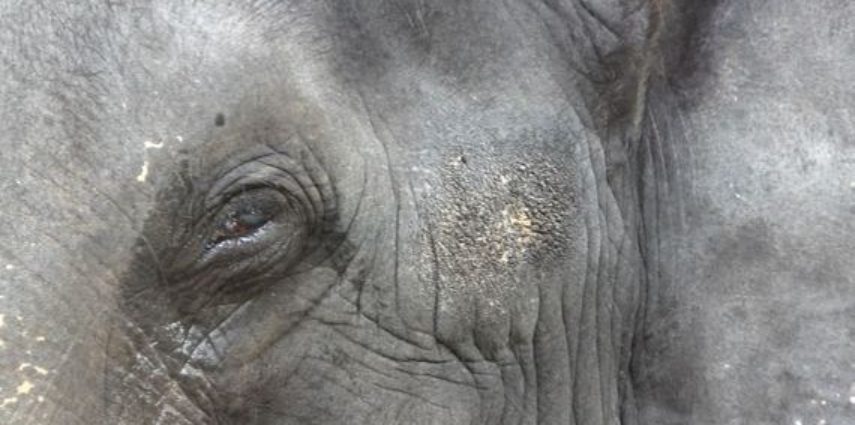Just before embarking on our final stretch of post-production, I returned to Kerala (a southern state of India), recently and was devastated to see what had happened to an elephant starring in my film, Gods in Shackles. Lakshmi is the beauty I had met in December 2013, a temple elephant who stole my heart. It was only in September 2014 that I’d last seen her. But within nine months Lakshmi’s life had taken a turn for the worse.
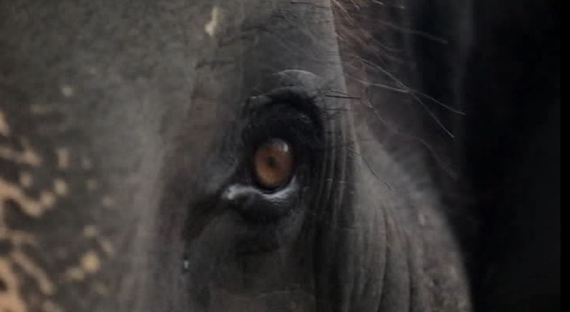
Lakshmi staring right at me with her gorgeous honey brown eye in September 2014
When I visited Lakshmi in June 2015, her left eye was swollen shut, tears constantly streaming down her face. Her mahout wasn’t there, but another replacement handler told me that Lakshmi’s mahout had punished her. Apparently, she’d eaten the vegetables he’d left unattended at the Thiruvambadi Temple, where she works, and the poor animal’s hunger instincts must have kicked in. But instead of feeding the elephant, her mahout beat her mercilessly in a fit of rage, and apparently one of his blows hit the animal’s left eye.
A couple of days later Lakshmi’s mahout showed up, but ignored me for a long time. I eventually confronted him, but he denied beating her on her face, and explained that he’d actually hit her on her forelimbs. Lakshmi’s veterinarian, Dr. Giridas from Kerala’s District Animal Husbandry Department didn’t even visit once to inspect Lakshmi during the five days I spent with her. It must have been easier for him to prescribe eye drops, and instruct Lakshmi’s mahouts to administer the medication.
After brutalizing her to lie down with shackles that were cruelly short and tight, they went to work. With their filthy hands, and nails caked in dirt they forced open her eye and using torturous and unscientific, methods poured in the eye drops.
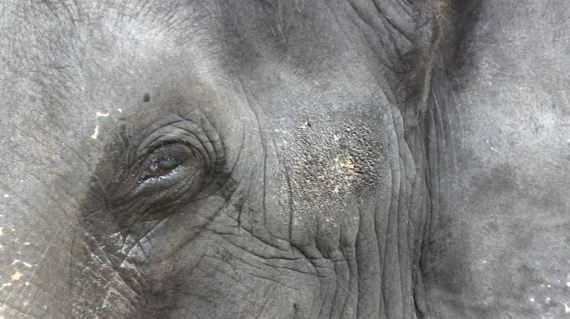
When I visited Lakshmi in June 2015, there was a white scar tissue on her cornea
A complaint was filed against this inhumane treatment. The Animal Welfare Board of India (AWBI), the only governmental body that oversees the welfare of animals in that country moved in swiftly, and launched an investigation (AWBI directive attached at the bottom of the article). It was revealed that the mahout had indeed poked Lakshmi’s eye with a sharp weapon.
“The lacerated cornea at 6″o” clock position is suggestive of a sharp prick injury from downwards…On recumbence detailed eye examination revealed a corneal tear at 6 “O” clock position leading to deep seated corneal ulcer with severely inflamed third eyelid… As the case is of corneal laceration that leads to corneal ulceration, immediate attention to the eye is a must to save the eye of the elephant.”
But instead, Lakshmi is receiving Ayurvedic treatment that tends to produce slow results. Worse yet, it is used in combination with conventional medicines. According to the AWBI report, the bottles were unlabeled and did not specify the contents. It seems to me that the conventional and Ayurvedic treatment didn’t gel.
“There is pain and agony to the elephant due to injury of the left eye and chronic irritation from the current combination of traditional medicine used as eye drops. The present mixed treatment regimen by traditional eye drops mixed with allopathic medicines is really questionable in the present scenario. A detailed ophthalmic examination and a proper treatment regimen with effective specific medications directed to the deep corneal ulcer and pan ophthalmitis is an inevitable requirement for the elephant.”
In a nut shell, the AWBI report says, Lakshmi could become permanently blind if the elephant doesn’t receive immediate attention. In an exclusive interview with me Dr. Jacobs Cheeran, a world renowned elephant veterinarian said,
“Prognosis depends on the level of injury. If it’s the inflammation is mild, it can recover without any damage. Once the scar is formed it will become permanently blind.”
What a heartbreaking story!! A temple elephant tortured into blindness because the poor hungry animal instinctively ate vegetables that she found nearby. Vinod Kumar, Assistant Secretary, of the AWBI said,
“If any person beats or tortures any animal it becomes a cruelty and it is a punishable offence. The Wildlife Protection Act requires that the culprits be put behind bars for seven years.”
Although the mahout seems to have escaped jail sentence, I’ve been informed that he was fired by the temple authorities. Lakshmi now has two new mahouts, and apparently both have worked with her in the past. Hopefully they are treating her better than the previous one.
Meantime, I’m disheartened to discover that the temple is still using Lakshmi for temple rituals. She circles the temple altar three times during each of the three daily rituals, silently bearing the excruciating agony in her injured eye, traumatized by the fear of her mahouts’ brutality.
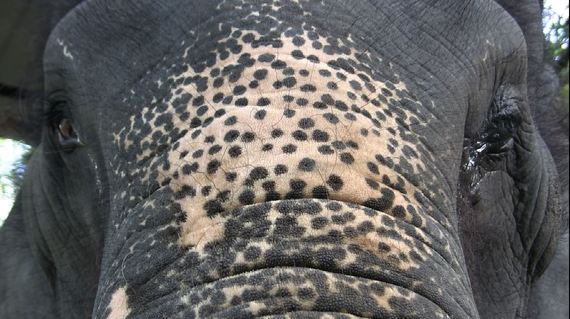
Lakshmi is forced to perform rituals with her eye injury
We’ve gathered undercover footage of Lakshmi’s entire ordeal. Gods in Shackles will expose the abhorrent torture that Lakshmi tolerates every single day. Her sad story along with that of four elephants featured in our film epitomizes the pain and suffering of more than 600 elephants of Kerala, whose welfare is being compromised for profit. Kerala has the largest number of privately owned captive elephants in India, and the largest number of male elephants in captivity on the planet.
Gods in Shackles is a feature length documentary film that exposes the exploitation of temple elephants for profit under the guise of religion. The movie will awaken people around the world, including of course those in Kerala and India, to the harsh realities of temple elephants. The movie will reveal the abhorrent torture of their state’s emblem, the country’s iconic animal — the embodiment of Lord Ganesha. We cannot turn a blind eye to the torture of God’s creations in temples — a place that is supposed to offer solace to wounded souls.
Elephants don’t deserve to be shackled and enslaved so people can be entertained. They belong in the wild and deserve to be freely wandering in the lush jungles and bonding with their families as humans do. As a civilized society we have a moral imperative to protect the largest mammal and one of the most intelligent animals on our planet — the vulnerable and the voiceless elephants.
If we don’t act swiftly approximately 50,000 Asian elephants left on our planet will be gone forever.
AWBI Directive to Thiruvambadi Temple
